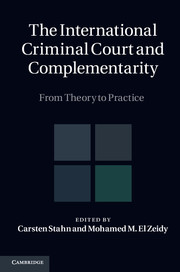Book contents
- Frontmatter
- Contents
- Acknowledgments
- Foreword by HE Judge Sang-Hyun Song
- Foreword by Patricia O’Brien
- Foreword by Silvia A. Fernandez de Gurmendi
- List of abbreviations
- Introduction: bridge over troubled waters?
- PART I General reflections
- PART II Origin and genesis of complementarity
- PART III Analytical dimensions of complementarity
- PART IV Interpretation and application
- PART IV (Continued) Interpretation and application
- PART V Complementarity in perspective
- PART VI Complementarity in practice
- 31 Making complementarity work: maximizing the limited role of the Prosecutor
- 32 Positive complementarity in action
- 33 Complementarity and the construction of national ability
- 34 The Colombian peace process (Law 975 of 2005) and the ICC’s principle of complementarity
- 35 Darfur: complementarity as the drafters intended?
- 36 Complementarity in Uganda: domestic diversity or international imposition?
- 37 Courts, conflict and complementarity in Uganda
- 38 Chasing cases: the ICC and the politics of state referral in the Democratic Republic of the Congo and Uganda
- 39 A problem, not a solution: complementarity in the Central African Republic and Democratic Republic of the Congo
- 40 Complementarity and the impact of the Rome Statute and the International Criminal Court in Kenya
- Index
- References
32 - Positive complementarity in action
from PART VI - Complementarity in practice
Published online by Cambridge University Press: 05 November 2014
- Frontmatter
- Contents
- Acknowledgments
- Foreword by HE Judge Sang-Hyun Song
- Foreword by Patricia O’Brien
- Foreword by Silvia A. Fernandez de Gurmendi
- List of abbreviations
- Introduction: bridge over troubled waters?
- PART I General reflections
- PART II Origin and genesis of complementarity
- PART III Analytical dimensions of complementarity
- PART IV Interpretation and application
- PART IV (Continued) Interpretation and application
- PART V Complementarity in perspective
- PART VI Complementarity in practice
- 31 Making complementarity work: maximizing the limited role of the Prosecutor
- 32 Positive complementarity in action
- 33 Complementarity and the construction of national ability
- 34 The Colombian peace process (Law 975 of 2005) and the ICC’s principle of complementarity
- 35 Darfur: complementarity as the drafters intended?
- 36 Complementarity in Uganda: domestic diversity or international imposition?
- 37 Courts, conflict and complementarity in Uganda
- 38 Chasing cases: the ICC and the politics of state referral in the Democratic Republic of the Congo and Uganda
- 39 A problem, not a solution: complementarity in the Central African Republic and Democratic Republic of the Congo
- 40 Complementarity and the impact of the Rome Statute and the International Criminal Court in Kenya
- Index
- References
Summary
The International Criminal Court (‘ICC’) is not meant to be a passive institution, simply waiting for the Security Council, States Parties and Article 12(3) states or others to seize the Court. It has its own responsibility to inspire states to fulfil their duties, not merely by example, but also by actively encouraging them to bring those responsible for crimes under international law to justice. In situations under investigation, the Office of the Prosecutor should vigorously investigate and, where there is sufficient admissible evidence, prosecute not only the highest level suspects, but also, if necessary, reach down lower. In so doing, it might shame national authorities into fulfilling their shared responsibility by investigating and prosecuting all the other cases that were beyond the Court's current resources.
Second, the Office of the Prosecutor should encourage states to ratify the Rome Statute and the Agreement on the Privileges and Immunities of the International Criminal Court (‘APIC’) and to enact effective implementing legislation to give their police, prosecutors and investigating judges the necessary tools to end impunity.
A policy of leaving it to states to devise alternatives to justice appears to be in direct conflict with the Preamble of the Rome Statute, in which the States Parties affirmed ‘that the most serious crimes of concern to the international community as a whole must not go unpunished and that their effective prosecution must be ensured by taking measures at the national level’, ‘determined to put an end to impunity for the perpetrators of these crimes’ and recalled that, ‘it is the duty of every State to exercise its criminal jurisdiction over those responsible for international crimes’. No exceptions are listed.
- Type
- Chapter
- Information
- The International Criminal Court and ComplementarityFrom Theory to Practice, pp. 1014 - 1051Publisher: Cambridge University PressPrint publication year: 2011
References
- 4
- Cited by



